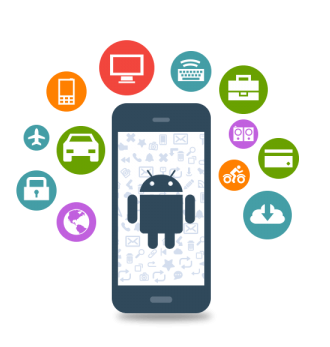
Mobile Applications
Mobile Application Development
Mobile application development is the process of creating software applications that run on a mobile device, and a typical mobile application utilizes a network connection to work with remote computing resources. Hence, the mobile development process involves creating installable software bundles (code, binaries, assets, etc.) , implementing backend services such as data access with an API, and testing the application on target devices.
Mobile Applications
A mobile application, most commonly referred to as an app, is a type of application software designed to run on a mobile device, such as a smartphone or tablet computer. Mobile applications frequently serve to provide users with similar services to those accessed on PCs.
A mobile application, most commonly referred to as an app, is a type of application software designed to run on a mobile device, such as a smartphone or tablet computer. Mobile applications frequently serve to provide users with similar services to those accessed on PCs. Apps are generally small, individual software units with limited function. This use of app software was originally popularized by Apple Inc. and its App Store, which offers thousands of applications for the iPhone, iPad and iPod Touch.
There are several types of apps currently available.
- Gaming apps: The equivalent of computer video games, they are among the most popular types of apps. They account for one-third of all app downloads and three-fourths of all consumer spending.
- Productivity apps: These focus on improving business efficiency by easing various tasks such as sending emails, tracking work progress, booking hotels, and much more.
- Lifestyle and entertainment apps: Increasingly popular, these encompass many aspects of personal lifestyle and socialization such as dating, communicating on social media, as well as sharing (and watching) videos. Some of the most widely known apps such as Netflix, Facebook or TikTok fall into this category.
A mobile application also may be known as an app, web app, online app, iPhone app or smartphone app.
There are two dominant platforms in the modern smartphone market. One is the iOS platform from Apple Inc. The iOS platform is the operating system that powers Apple's popular line of iPhone smartphones. The second is Android from Google. The Android operating system is used not only by Google devices but also by many other OEMs to built their own smartphones and other smart devices.
Although there are some similarities between these two platforms when building applications, developing for iOS vs. developing for Android involves using different software development kits (SDKs) and different development toolchain. While Apple uses iOS exclusively for its own devices, Google makes Android available to other companies provided they meet specific requirements such as including certain Google applications on the devices they ship. Developers can build apps for hundreds of millions of devices by targeting both of these platforms.
Mobile applications are a move away from the integrated software systems generally found on PCs. Instead, each app provides limited and isolated functionality such as a game, calculator or mobile web browsing. Although applications may have avoided multitasking because of the limited hardware resources of the early mobile devices, their specificity is now part of their desirability because they allow consumers to hand-pick what their devices are able to do.
The simplest mobile apps take PC-based applications and port them to a mobile device. As mobile apps become more robust, this technique is somewhat lacking. A more sophisticated approach involves developing specifically for the mobile environment, taking advantage of both its limitations and advantages. For example, apps that use location-based features are inherently built from the ground up with an eye to mobile given that the user is not tied to a location, as on PC.
Apps are divided into two broad categories: native apps and web apps. Native apps are built for a specific mobile operating system, usually iOS or Android. Native apps enjoy better performance and a more finely-tuned user interface (UI), and usually need to pass a much stricter development and quality assurance process before they are released.
A mobile application, most commonly known as an app, is a kind of application software intended to run on a mobile phone, for example, a smartphone or tablet PC. Mobile applications often serve to furnish clients with comparable administrations to those got on PCs. Apps are by and large small, individual software units with restricted capacity. This utilization of application programming was initially advocated by Apple Inc. also, its App Store, which offers a huge number of uses for the iPhone, iPad, and iPod Touch.
In opposition to applications intended for desktop computers, mobile applications move away from incorporated software systems. All things being equal, every versatile application gives segregated and restricted usefulness. For instance, it tends to be a game, a number cruncher, or a portable internet browser. Candy Crush Saga, The Sims Mobile, Among Us!, and Subway Surfers,… are the mobile application examples that are operated by those processes.
The 6 Main Types of Mobile Apps
Lifestyle Mobile Apps. Lifestyle apps have come on strong in recent years. ...
Social Media Mobile Apps
Utility Mobile Apps
Games/Entertainment Mobile Apps
Productivity Mobile Apps
News/Information Outlets Mobile Apps.
